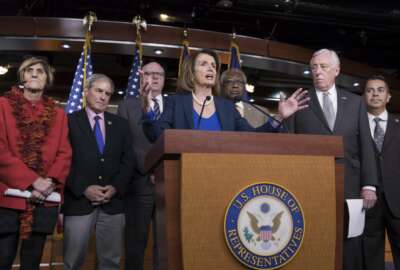
Federal judge consolidates unions’ executive order lawsuits, sets hearing date
A federal judge will hear a motion for summary judgment on several federal unions' objections to the president's recent executive orders in U.S. District Court on...
A federal judge has consolidated lawsuits from several federal unions challenging the president’s three recent executive orders on employee accountability, official time and collective bargaining.
A judge will hear a motion for summary judgment in U.S. District Court on July 25, the National Treasury Employees Union (NTEU) said June 19.
“We are thrilled that U.S. District Court Judge Ketanji Brown Jackson has expedited this important case because it is an urgent matter that affects federal employees all over the country and their ability to be treated fairly in the workplace,” NTEU National President Tony Reardon said in a statement.
Both NTEU and the American Federation of Government Employees (AFGE) previously filed separate lawsuits in the U.S. District Court for the District of Columbia earlier this month. A coalition of 13 federal unions, led by the National Federation of Federal Employees (NFFE), filed a separate suit last week in federal district court.
Their suits all differed slightly but broadly challenged the president’s executive authority to legislate beyond the scope of the Civil Service Reform Act and Federal Service Labor-Management Relations (FSLMR) Statute, the unions argued.
The president’s executive orders have also collected a wide variety of concern from both Republicans and Democrats in Congress.
Nearly all Senate Democrats, 45 in total, are now expressing their concern with the president’s recent EOs. In a letter to President Donald Trump, the senators asked that the White House reconsider these orders.
“At a minimum, we hope you will ensure that managers at federal agencies do not use these executive orders inappropriately to circumvent existing collective bargaining agreements between agencies and federal workers,” the senators wrote in a June 19 letter.
Senate Minority Leader Chuck Schumer (D-N.Y.), along with Sens. Ben Cardin (D-Md.) Chris Van Hollen (D-Md.) Tim Kaine (D-Va.) and Mark Warner (D-Va.), are among the members who signed the letter.
“We support improving the performance of the federal workforce, but these executive orders will do the opposite,” the senators said. “These executive orders discourage federal agencies from using their discretion to create reasonable plans for federal employees to improve their performance if they are at risk of demotion or termination. Firing employees without due process undermines the merit-based civil service system and opens the door for managers to satisfy their own personal vendettas or political agendas.”
Citing the president’s new EOs, the Housing and Urban Development Department has already told AFGE representatives to vacant HUD facilities and stop using the agency’s parking spaces, computers, phones and other resources. Other agencies, such as the Health and Human Services Department and Social Security Administration, may follow in their footsteps.
The senators said these agencies should drop their plans to abrogate existing collective bargaining agreements, and the president should direct other departments not to follow suit.
The president’s EOs have already earned criticism from 21 Republicans and 23 Democrats in the House.
Separately, 23 unions have asked Special Counsel Henry Kerner to pay special attention to these orders.
“We are concerned the labor relations professionals with whom many of us have good working
relationships will face reprisal if they continue to engage in good faith as required by the FSLMR
statute,” the unions wrote in a June 19 letter. “We believe the administration, through its executive orders and other actions, is violating the law and asking individual agencies and components to also violate clearly established law. This will require civil servants, who are labor relations professionals at various agencies, to carry out orders that violate federal statute.”
Specifically, the unions asked the Office of Special Counsel to investigate cases of retaliation that may arise with agency labor relations employees who push back against the president’s EOs.
Relationships between management and labor haven’t always been smooth-sailing, the unions said, but agencies have generally respected the federal relations statute and have tried to bargain in good faith.
Copyright © 2025 Federal News Network. All rights reserved. This website is not intended for users located within the European Economic Area.
Nicole Ogrysko is a reporter for Federal News Network focusing on the federal workforce and federal pay and benefits.
Follow @nogryskoWFED
Related Stories







